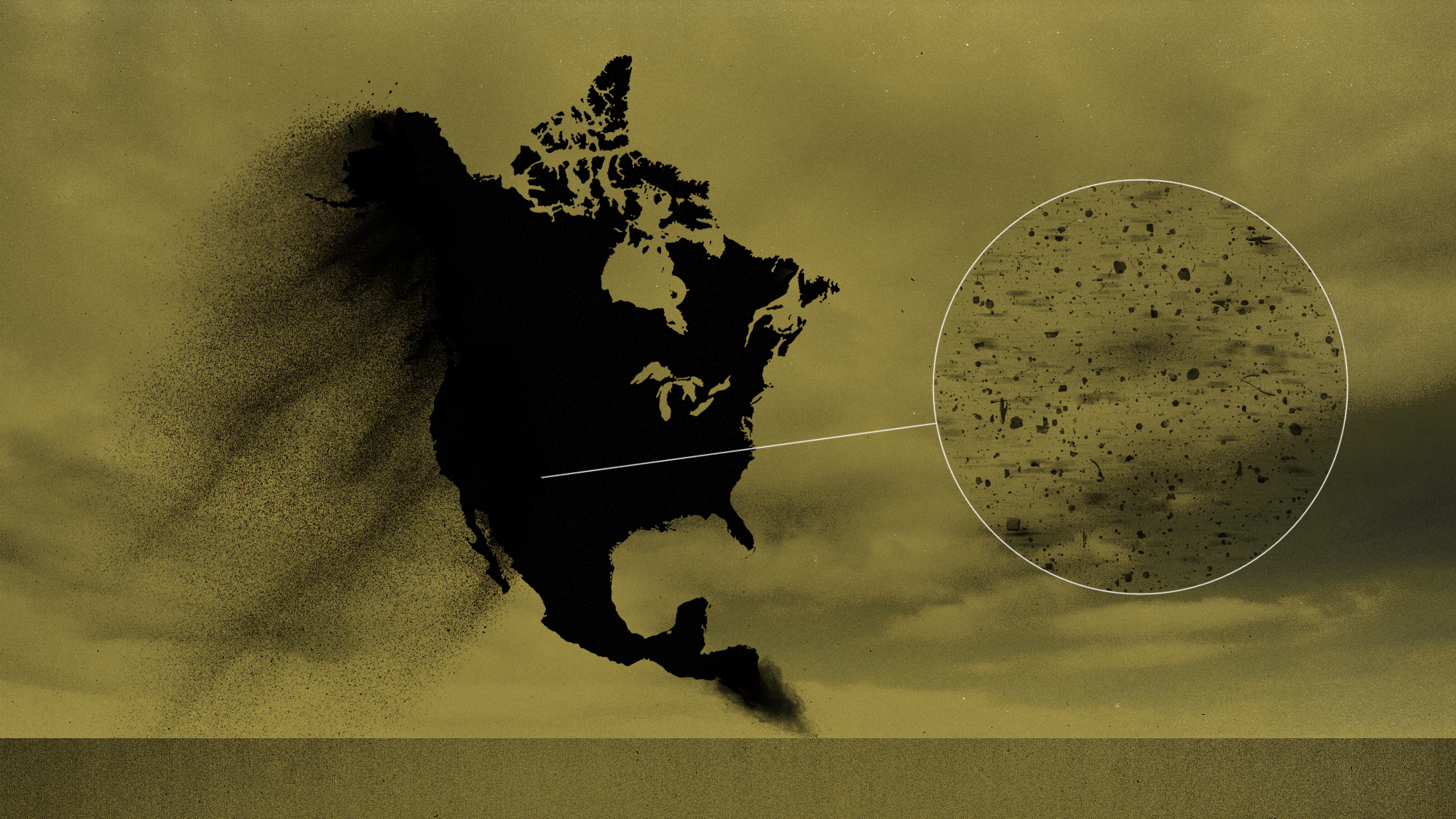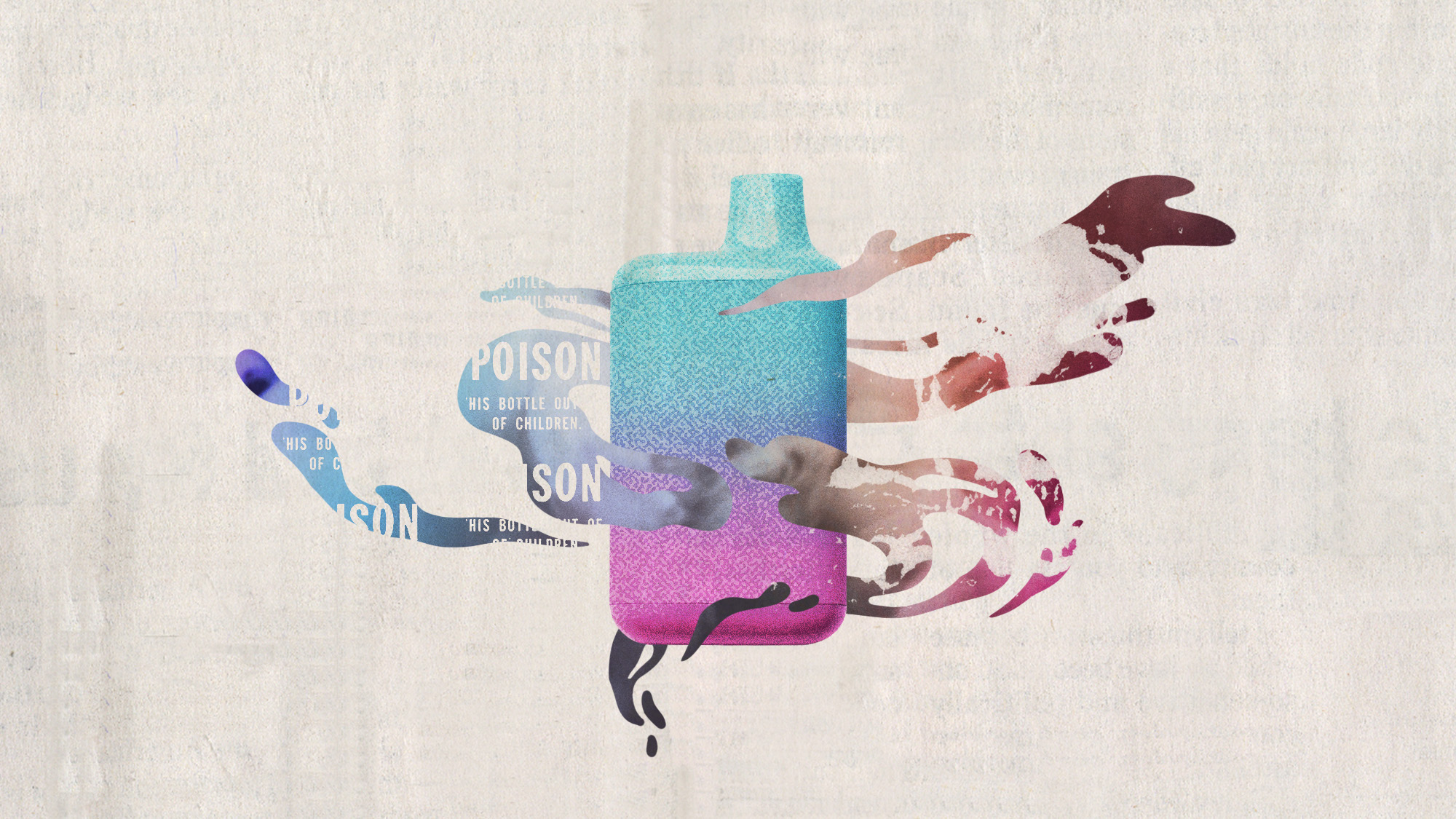The microplastics hurricanes blowing across North America
New research confirms global pervasiveness of harmful microplastic pollution

A free daily email with the biggest news stories of the day – and the best features from TheWeek.com
You are now subscribed
Your newsletter sign-up was successful
Hurricane Larry brought an "astonishing" amount of microplastics into previously unpolluted areas when it hit Canada in 2021, according to a new study.
When the storm battered Newfoundland, two students from Dalhousie University in Halifax went to a clearing in its path near St Michaels, a community of fewer than 300 people, to find out whether "the ocean might whip microplastics up into the atmosphere then transport them by air to otherwise pristine conditions", said CBC News.
More than 100,000 particles of plastic per square metre were collected per day during the hurricane, according to the findings published last week in leading science journal Nature – more than any other study of atmospheric microplastics. The result, lead researcher Anna Ryan told CBC, was "astonishing".
The Week
Escape your echo chamber. Get the facts behind the news, plus analysis from multiple perspectives.

Sign up for The Week's Free Newsletters
From our morning news briefing to a weekly Good News Newsletter, get the best of The Week delivered directly to your inbox.
From our morning news briefing to a weekly Good News Newsletter, get the best of The Week delivered directly to your inbox.
Why are microplastics in the air?
Microplastics are "tiny pieces of plastic, less than five millimetres in length", said CBC, which come from the "degradation" or shedding of particles from larger plastic products like water bottles, packaging and synthetic clothes.
Because these tiny microplastics travel so readily on winds and ocean currents, research has shown that even "the most pristine" environments like rural St Michaels "now have plastics in the air", said Ryan.
But a hurricane's impact on the spread of microplastics had never been studied before, Ryan explained to New Scientist – this was their chance. Because warm ocean water contributes to hurricane formation, Ryan and her team wondered whether hurricanes could pick up microplastics from the sea's surface and deposit them when they made landfall.
Now, the findings suggest that hurricanes are "yet another way for plastic particles to spread where they don't belong", said Wired.
A free daily email with the biggest news stories of the day – and the best features from TheWeek.com
What did the study find?
The team installed a glass cylinder, secured to the ground with wooden stakes, in that Newfoundland clearing. From two days before Hurricane Larry arrived to two days after it, the researchers would empty the cylinder every six hours. It would have collected any falling particles, and any rain that fell.
"The team found that even before and after Larry, tens of thousands of microplastics fell per square metre of land per day," said Wired.
But when Larry hit, that figure shot up to, at its highest, nearly 114,000. Ryan told CBC that was a far higher amount than has been found in any other study of atmospheric microplastics.
That may be because the storm passed over the so–called "garbage patch" of the North Atlantic Gyre, said New Scientist, a "gyre" being a region where currents move in an inward, circular motion, thus trapping debris, creating an unusually high amount of accumulated waste.
By simulating where the air had been before arriving at the cylinder, using a technique called back trajectory modelling, the scientists confirmed Larry picked up the microplastics at sea.
These numbers are probably underestimates, as "it remains difficult and expensive to look for the smallest of plastic particles", said Wired. The scientists could only measure microplastics up to a certain size – there were likely more particles that went unrecorded.
Steve Allen, a University of Birmingham microplastic researcher and co–author of the paper, told Wired: "The numbers in this paper here are just staggering."
What does this mean for us?
"There's still a lot of questions as far as the full extent of microplastic impacts," Ryan said to New Scientist.
Microplastic pollution is a "growing concern", said CBC, which poses "a risk to human and animal health, as well as overall ecosystem health, though the extent of that harm is still not well understood".
“Scientists are racing to figure out how the particles are affecting the organisms" in previously pristine, but now microplastic–polluted, environments, said Wired. Research has already revealed that Arctic creatures and their diets contain microplastics.
We must limit single–use plastics, Ryan told CBC, to prevent them entering the environment at all.
Ultimately, said Wired, the research is "ominous", showing that microplastics "are not only infiltrating every corner of the environment", but are "readily moving between land, sea, and air".
-
 Political cartoons for February 15
Political cartoons for February 15Cartoons Sunday's political cartoons include political ventriloquism, Europe in the middle, and more
-
 The broken water companies failing England and Wales
The broken water companies failing England and WalesExplainer With rising bills, deteriorating river health and a lack of investment, regulators face an uphill battle to stabilise the industry
-
 A thrilling foodie city in northern Japan
A thrilling foodie city in northern JapanThe Week Recommends The food scene here is ‘unspoilt’ and ‘fun’
-
 Greenland’s capital becomes ground zero for the country’s diplomatic straits
Greenland’s capital becomes ground zero for the country’s diplomatic straitsIN THE SPOTLIGHT A flurry of new consular activity in Nuuk shows how important Greenland has become to Europeans’ anxiety about American imperialism
-
 Epstein files topple law CEO, roil UK government
Epstein files topple law CEO, roil UK governmentSpeed Read Peter Mandelson, Britain’s former ambassador to the US, is caught up in the scandal
-
 Mexico’s vape ban has led to a cartel-controlled black market
Mexico’s vape ban has led to a cartel-controlled black marketUnder the Radar Cartels have expanded their power over the sale of illicit tobacco
-
 Iran and US prepare to meet after skirmishes
Iran and US prepare to meet after skirmishesSpeed Read The incident comes amid heightened tensions in the Middle East
-
 Israel retrieves final hostage’s body from Gaza
Israel retrieves final hostage’s body from GazaSpeed Read The 24-year-old police officer was killed during the initial Hamas attack
-
 China’s Xi targets top general in growing purge
China’s Xi targets top general in growing purgeSpeed Read Zhang Youxia is being investigated over ‘grave violations’ of the law
-
 Panama and Canada are negotiating over a crucial copper mine
Panama and Canada are negotiating over a crucial copper mineIn the Spotlight Panama is set to make a final decision on the mine this summer
-
 Why Greenland’s natural resources are nearly impossible to mine
Why Greenland’s natural resources are nearly impossible to mineThe Explainer The country’s natural landscape makes the task extremely difficult